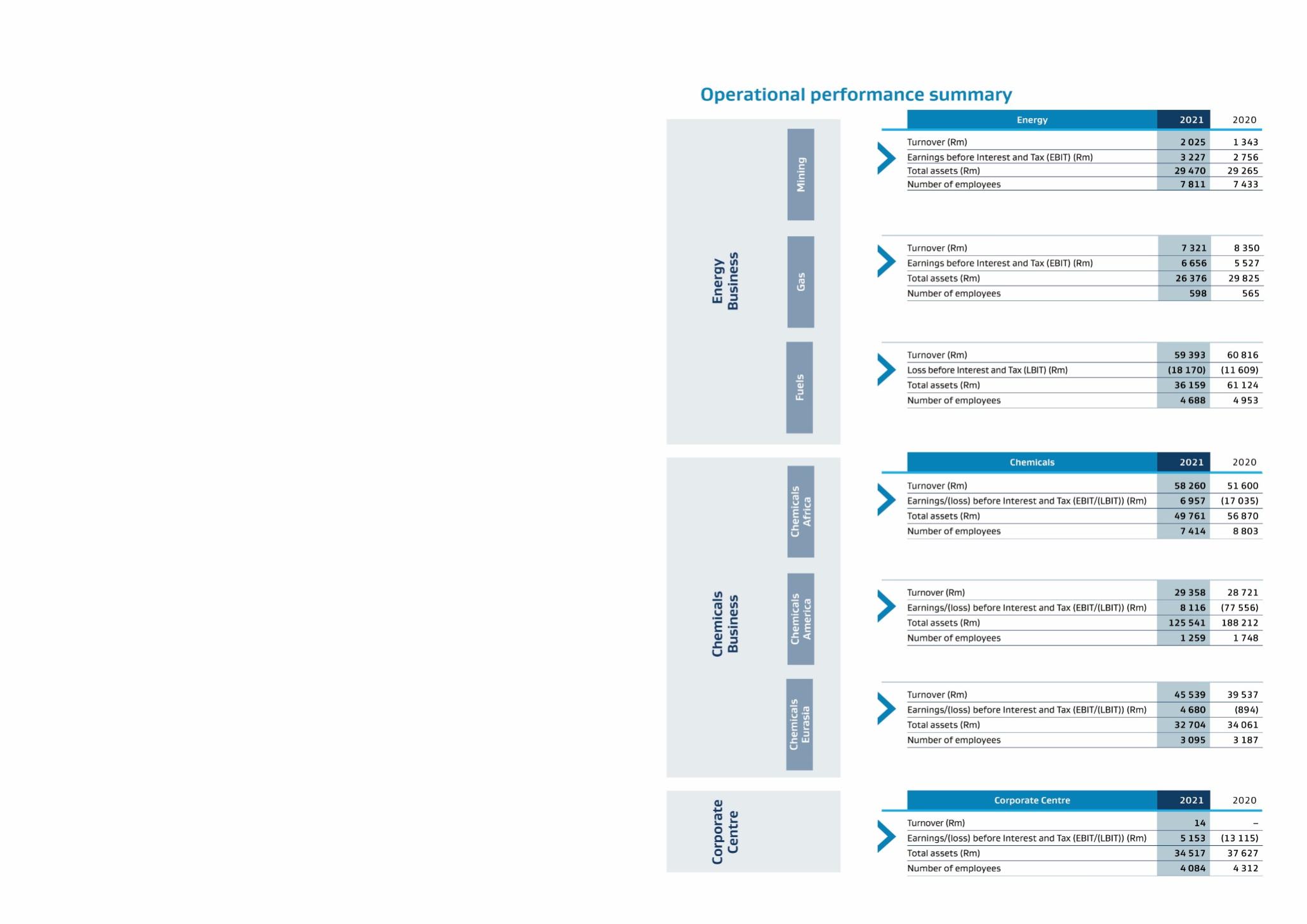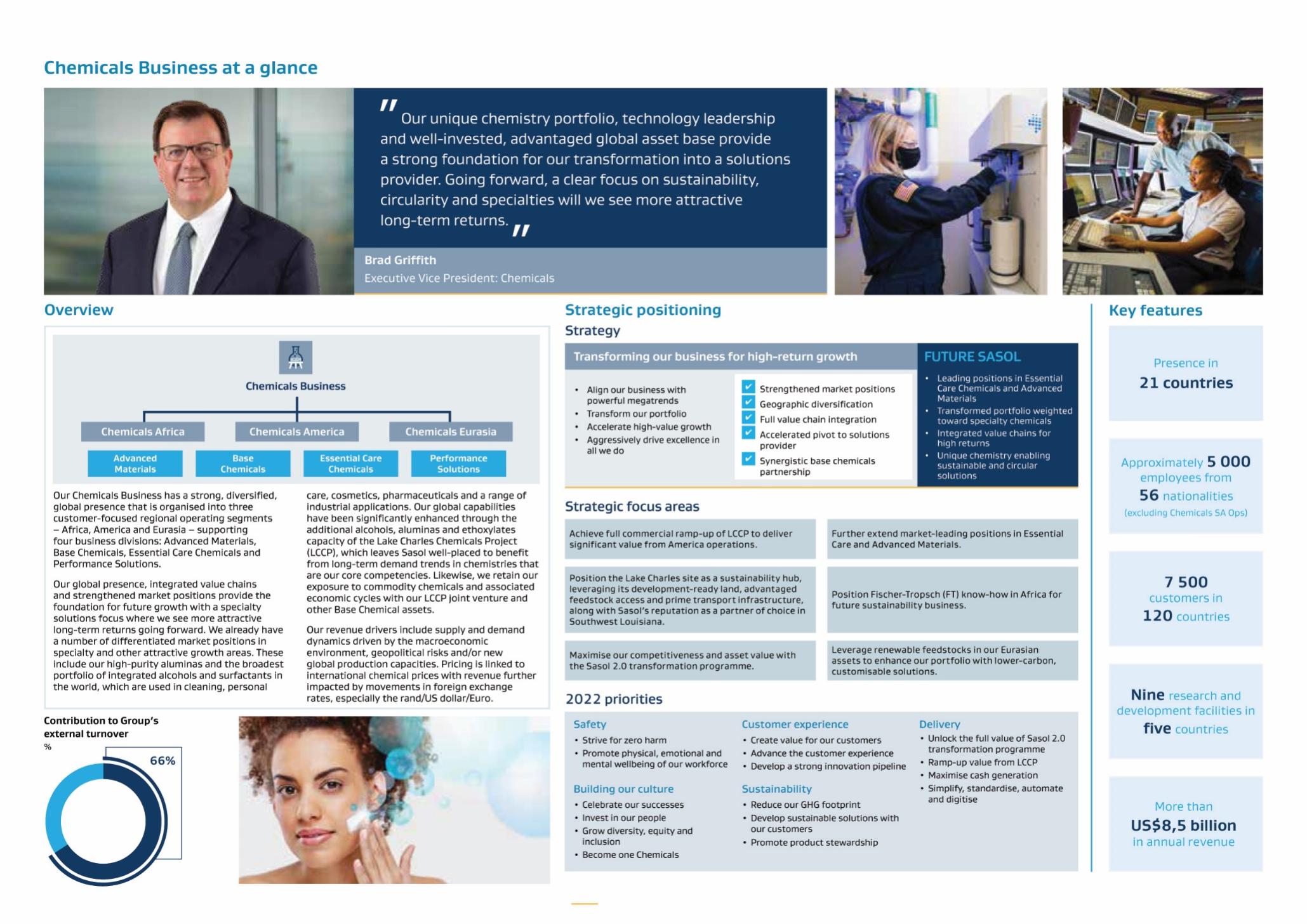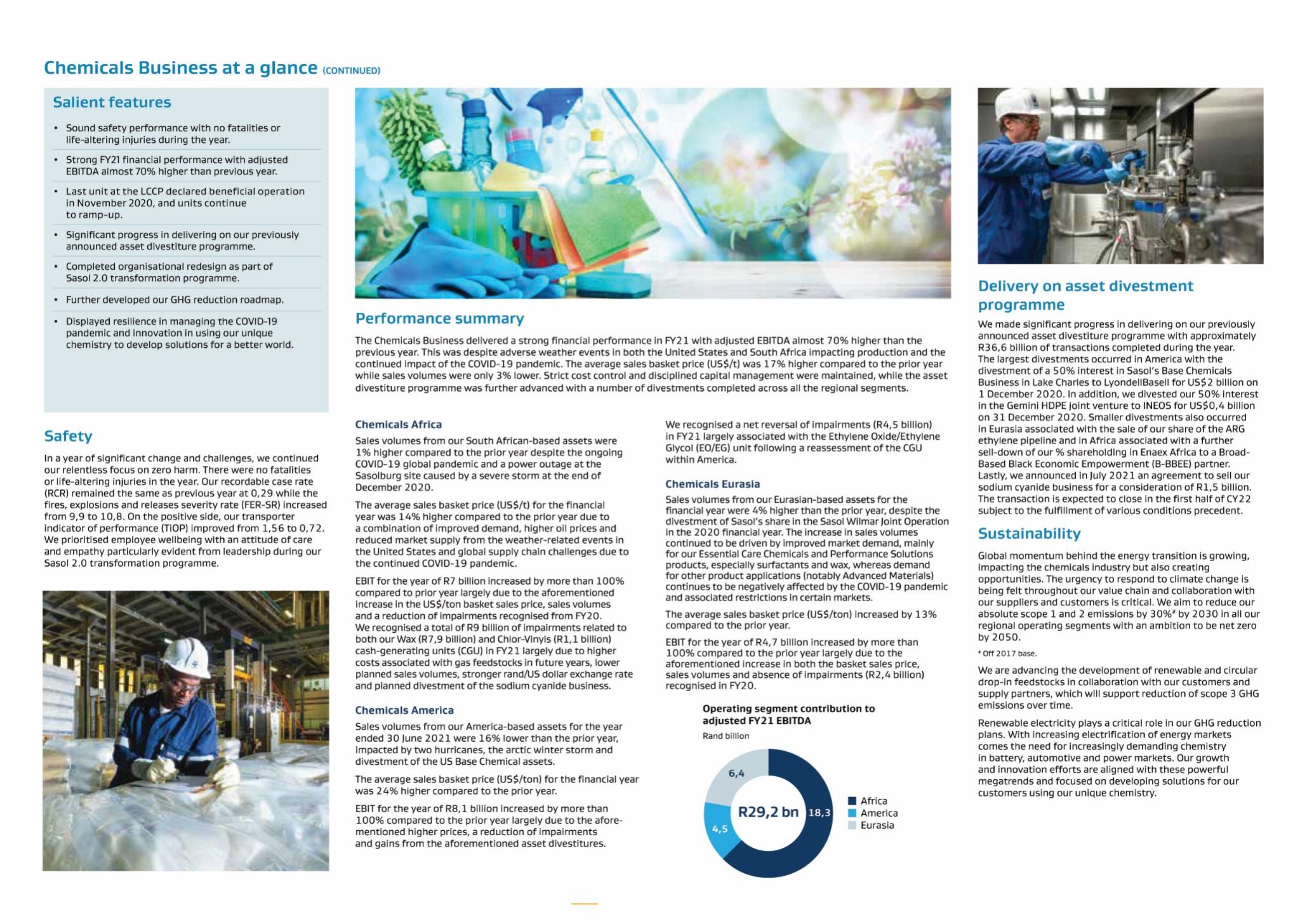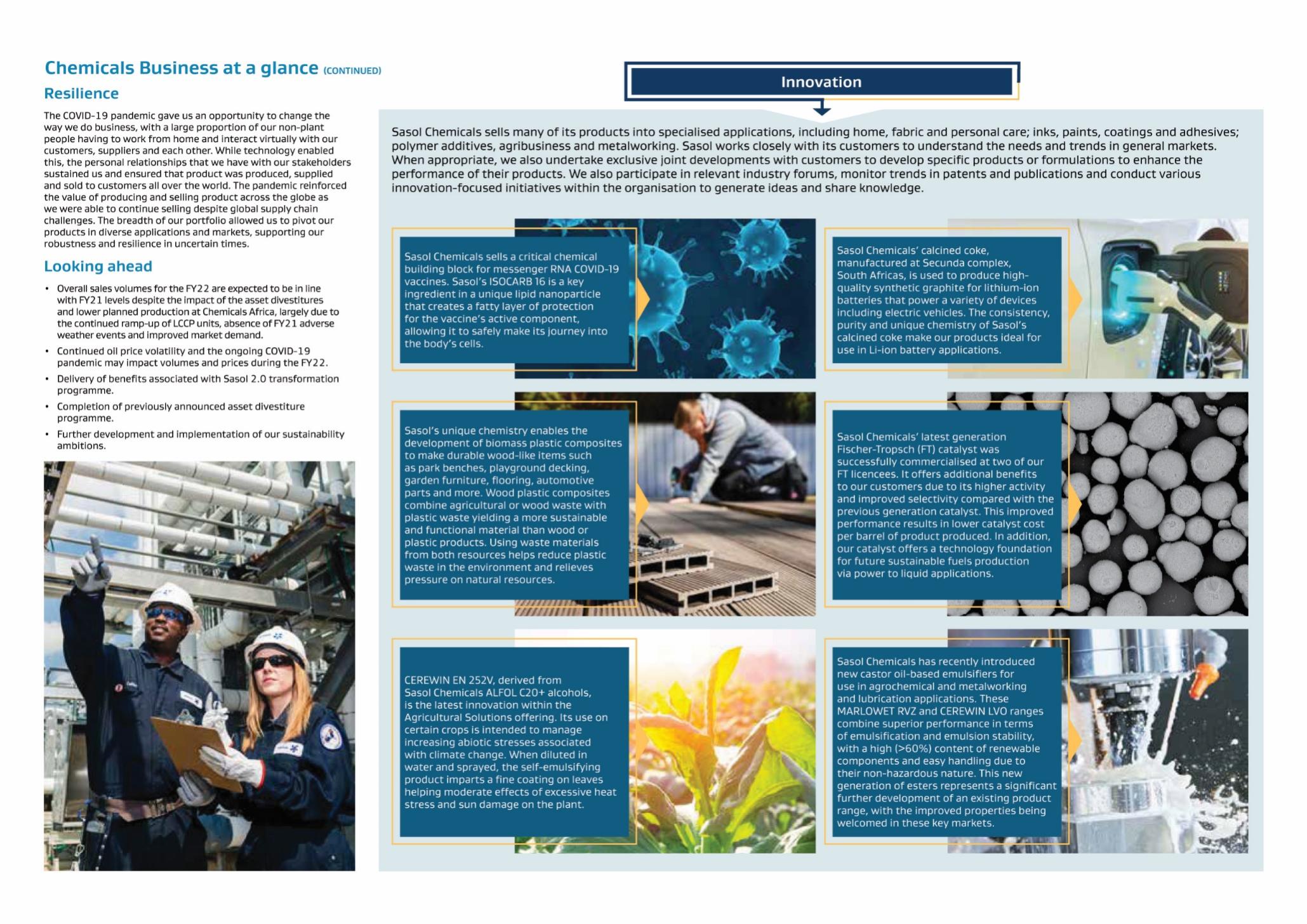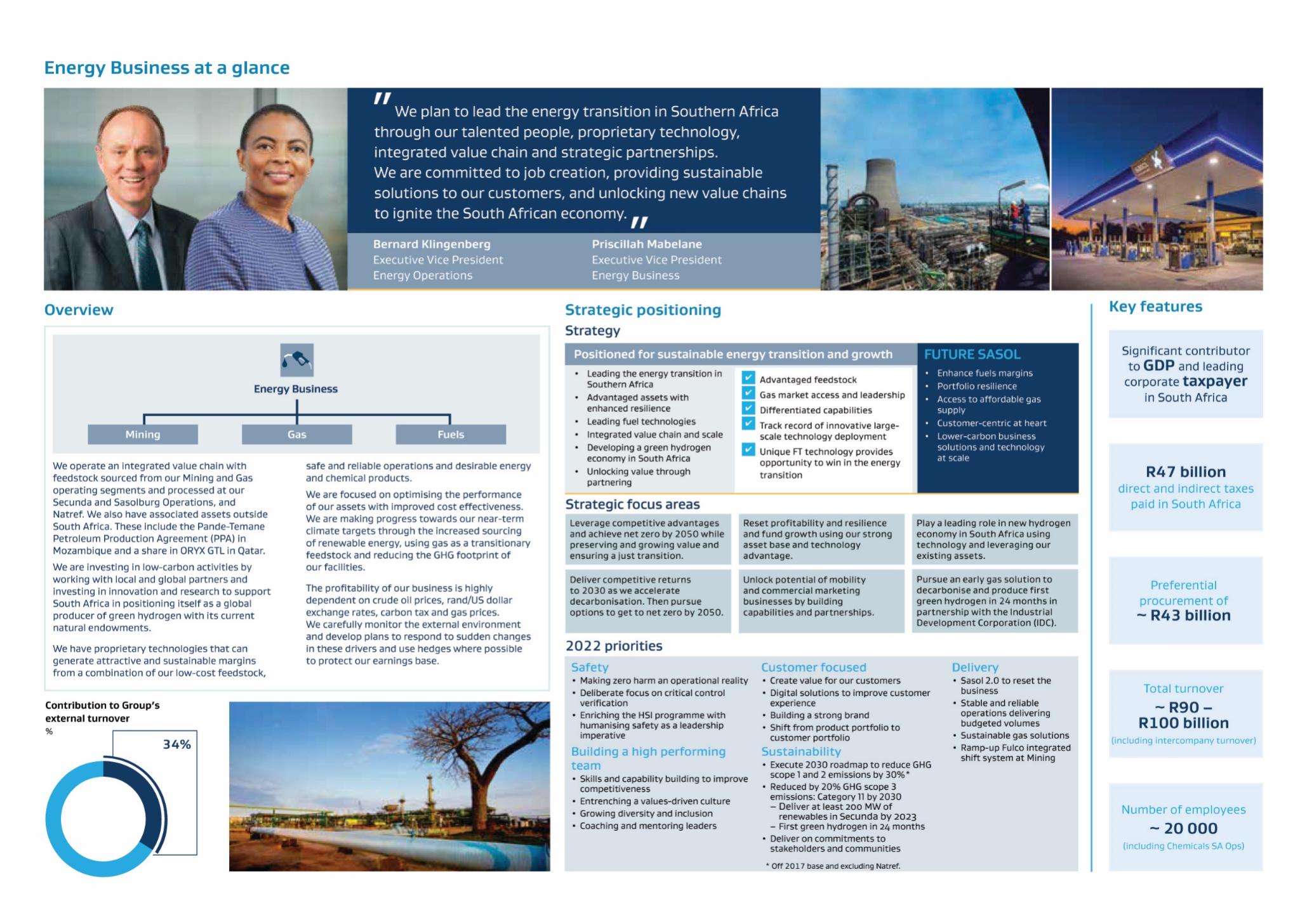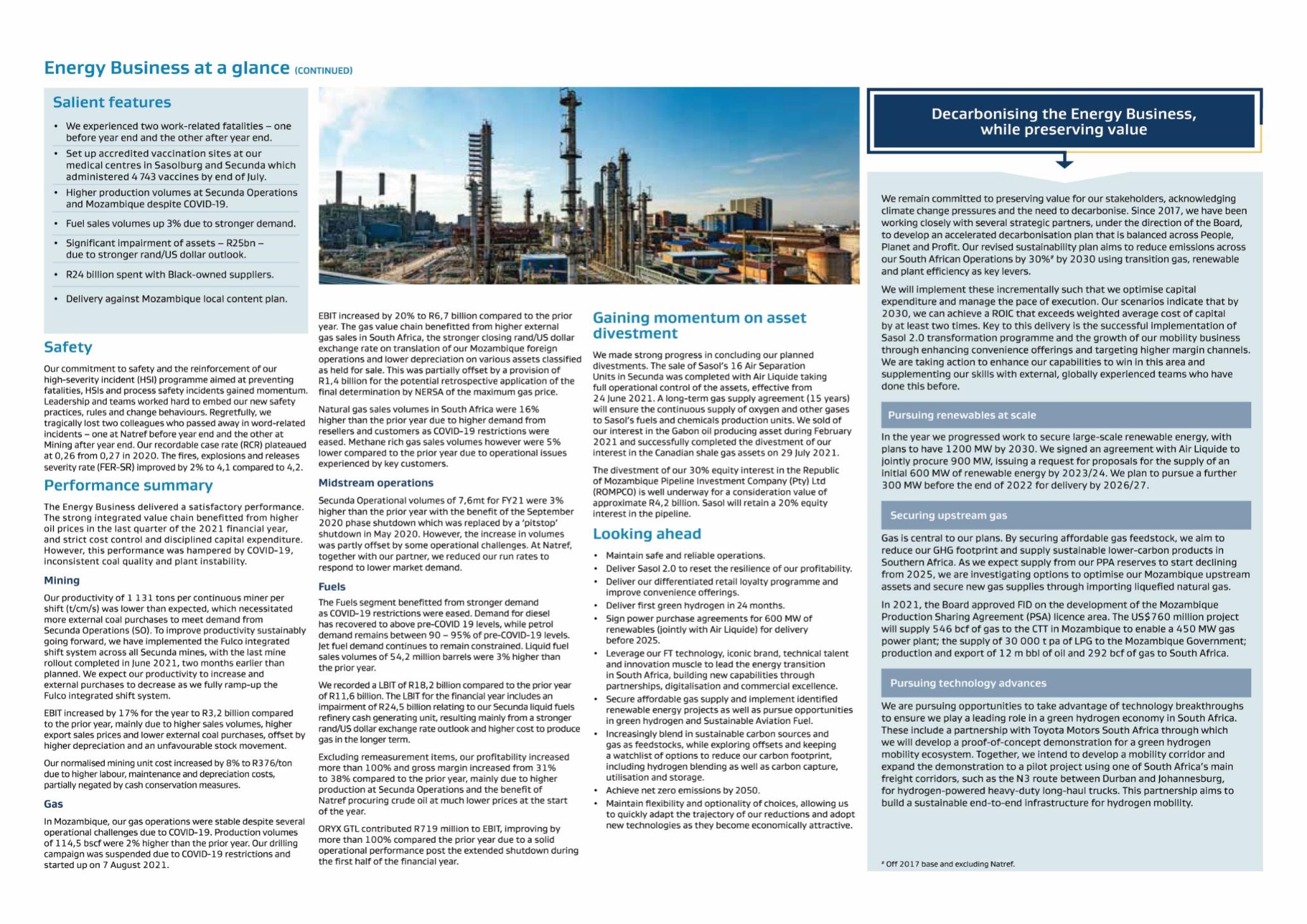
| 1 2 3 4 5 6 Energy Business at a glance (CONTINUED) before year end and the other after year end. climate change pressures and the need to decarbonise. Since 2017, we have been Planet and Profit. Our revised sustainability plan aims to reduce emissions across expenditure and manage the pace of execution. Our scenarios indicate that by EBIT increased by 20% to R6,7 billion compared to the prior year. The gas value chain benefitted from higher external gas sales in South Africa, the stronger closing rand/US dollar exchange rate on translation of our Mozambique foreign operations and lower depreciation on various assets classified as held for sale. This was partially offset by a provision of R1,4 billion for the potential retrospective application of the final determination by NERSA of the maximum gas price. Natural gas sales volumes in South Africa were 16% higher than the prior year due to higher demand from resellers and customers as COVID-19 restrictions were eased. Methane rich gas sales volumes however were 5% lower compared to the prior year due to operational issues experienced by key customers. Midstream operations Secunda Operational volumes of 7,6mt for FY21 were 3% higher than the prior year with the benefit of the September 2020 phase shutdown which was replaced by a ‘pitstop’ shutdown in May 2020. However, the increase in volumes was partly offset by some operational challenges. At Natref, together with our partner, we reduced our run rates to respond to lower market demand. Fuels The Fuels segment benefitted from stronger demand as COVID-19 restrictions were eased. Demand for diesel has recovered to above pre-COVID 19 levels, while petrol demand remains between 90 – 95% of pre-COVID-19 levels. Jet fuel demand continues to remain constrained. Liquid fuel sales volumes of 54,2 million barrels were 3% higher than the prior year. We recorded a LBIT of R18,2 billion compared to the prior year of R11,6 billion. The LBIT for the financial year includes an impairment of R24,5 billion relating to our Secunda liquid fuels refinery cash generating unit, resulting mainly from a stronger rand/US dollar exchange rate outlook and higher cost to produce gas in the longer term. Excluding remeasurement items, our profitability increased more than 100% and gross margin increased from 31% to 38% compared to the prior year, mainly due to higher production at Secunda Operations and the benefit of Natref procuring crude oil at much lower prices at the start of the year. ORYX GTL contributed R719 million to EBIT, improving by more than 100% compared the prior year due to a solid operational performance post the extended shutdown during the first half of the financial year. Gaining momentum on asset divestment We made strong progress in concluding our planned divestments. The sale of Sasol’s 16 Air Separation Units in Secunda was completed with Air Liquide taking full operational control of the assets, effective from 24 June 2021. A long-term gas supply agreement (15 years) will ensure the continuous supply of oxygen and other gases to Sasol’s fuels and chemicals production units. We sold of our interest in the Gabon oil producing asset during February 2021 and successfully completed the divestment of our interest in the Canadian shale gas assets on 29 July 2021. The divestment of our 30% equity interest in the Republic of Mozambique Pipeline Investment Company (Pty) Ltd (ROMPCO) is well underway for a consideration value of approximate R4,2 billion. Sasol will retain a 20% equity interest in the pipeline. Looking ahead • Maintain safe and reliable operations. • Deliver Sasol 2.0 to reset the resilience of our profitability. • Deliver our differentiated retail loyalty programme and improve convenience offerings. • Deliver first green hydrogen in 24 months. • Sign power purchase agreements for 600 MW of renewables (jointly with Air Liquide) for delivery before 2025. • Leverage our FT technology, iconic brand, technical talent and innovation muscle to lead the energy transition in South Africa, building new capabilities through partnerships, digitalisation and commercial excellence. • Secure affordable gas supply and implement identified renewable energy projects as well as pursue opportunities in green hydrogen and Sustainable Aviation Fuel. • Increasingly blend in sustainable carbon sources and gas as feedstocks, while exploring offsets and keeping a watchlist of options to reduce our carbon footprint, including hydrogen blending as well as carbon capture, utilisation and storage. • Achieve net zero emissions by 2050. • Maintain flexibility and optionality of choices, allowing us to quickly adapt the trajectory of our reductions and adopt new technologies as they become economically attractive. Safety Our commitment to safety and the reinforcement of our high-severity incident (HSI) programme aimed at preventing fatalities, HSIs and process safety incidents gained momentum. Leadership and teams worked hard to embed our new safety practices, rules and change behaviours. Regretfully, we tragically lost two colleagues who passed away in word-related incidents – one at Natref before year end and the other at Mining after year end. Our recordable case rate (RCR) plateaued at 0,26 from 0,27 in 2020. The fires, explosions and releases severity rate (FER-SR) improved by 2% to 4,1 compared to 4,2. Performance summary The Energy Business delivered a satisfactory performance. The strong integrated value chain benefitted from higher oil prices in the last quarter of the 2021 financial year, and strict cost control and disciplined capital expenditure. However, this performance was hampered by COVID-19, inconsistent coal quality and plant instability. Mining Our productivity of 1 131 tons per continuous miner per shift (t/cm/s) was lower than expected, which necessitated more external coal purchases to meet demand from Secunda Operations (SO). To improve productivity sustainably going forward, we have implemented the Fulco integrated shift system across all Secunda mines, with the last mine rollout completed in June 2021, two months earlier than planned. We expect our productivity to increase and external purchases to decrease as we fully ramp-up the Fulco integrated shift system. EBIT increased by 17% for the year to R3,2 billion compared to the prior year, mainly due to higher sales volumes, higher export sales prices and lower external coal purchases, offset by higher depreciation and an unfavourable stock movement. Our normalised mining unit cost increased by 8% to R376/ton due to higher labour, maintenance and depreciation costs, partially negated by cash conservation measures. Gas In Mozambique, our gas operations were stable despite several operational challenges due to COVID-19. Production volumes of 114,5 bscf were 2% higher than the prior year. Our drilling campaign was suspended due to COVID-19 restrictions and started up on 7 August 2021. Sasol Integrated Report 2021 51 We remain committed to preserving value for our stakeholders, acknowledging working closely with several strategic partners, under the direction of the Board, to develop an accelerated decarbonisation plan that is balanced across People, our South African Operations by 30%# by 2030 using transition gas, renewable and plant efficiency as key levers. We will implement these incrementally such that we optimise capital 2030, we can achieve a ROIC that exceeds weighted average cost of capital by at least two times. Key to this delivery is the successful implementation of Sasol 2.0 transformation programme and the growth of our mobility business through enhancing convenience offerings and targeting higher margin channels. We are taking action to enhance our capabilities to win in this area and supplementing our skills with external, globally experienced teams who have done this before. In the year we progressed work to secure large-scale renewable energy, with plans to have 1200 MW by 2030. We signed an agreement with Air Liquide to jointly procure 900 MW, issuing a request for proposals for the supply of an initial 600 MW of renewable energy by 2023/24. We plan to pursue a further 300 MW before the end of 2022 for delivery by 2026/27. Gas is central to our plans. By securing affordable gas feedstock, we aim to reduce our GHG footprint and supply sustainable lower-carbon products in Southern Africa. As we expect supply from our PPA reserves to start declining from 2025, we are investigating options to optimise our Mozambique upstream assets and secure new gas supplies through importing liquefied natural gas. In 2021, the Board approved FID on the development of the Mozambique Production Sharing Agreement (PSA) licence area. The US$760 million project will supply 546 bcf of gas to the CTT in Mozambique to enable a 450 MW gas power plant; the supply of 30 000 t pa of LPG to the Mozambique Government; production and export of 12 m bbl of oil and 292 bcf of gas to South Africa. We are pursuing opportunities to take advantage of technology breakthroughs to ensure we play a leading role in a green hydrogen economy in South Africa. These include a partnership with Toyota Motors South Africa through which we will develop a proof-of-concept demonstration for a green hydrogen mobility ecosystem. Together, we intend to develop a mobility corridor and expand the demonstration to a pilot project using one of South Africa’s main freight corridors, such as the N3 route between Durban and Johannesburg, for hydrogen-powered heavy-duty long-haul trucks. This partnership aims to build a sustainable end-to-end infrastructure for hydrogen mobility. # Off 2017 base and excluding Natref. Pursuing technology advances Securing upstream gas Pursuing renewables at scale Salient features • We experienced two work-related fatalities – one • Set up accredited vaccination sites at our medical centres in Sasolburg and Secunda which administered 4 743 vaccines by end of July. • Higher production volumes at Secunda Operations and Mozambique despite COVID-19. • Fuel sales volumes up 3% due to stronger demand. • Significant impairment of assets – R25bn – due to stronger rand/US dollar outlook. • R24 billion spent with Black-owned suppliers. • Delivery against Mozambique local content plan. Decarbonising the Energy Business, while preserving value
|
